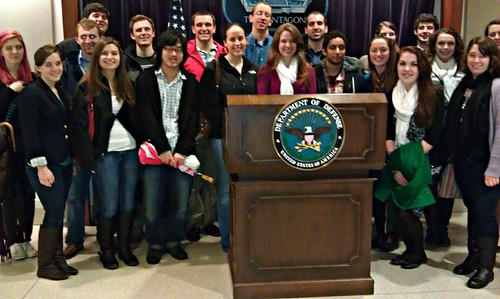 Students enrolled in the terrorism studies minor program visited the Pentagon last month during a trip designed to illustrate the impact of 9/11 on domestic security and foreign affairs.
Students enrolled in the terrorism studies minor program visited the Pentagon last month during a trip designed to illustrate the impact of 9/11 on domestic security and foreign affairs.
Thirty students from BSOS 331 (Responses to Terrorism) one of three required courses for the START-developed program participated in the excursion, which was led by START's Associate Director for Education Katherine Worboys Izsak and Education Coordinator Sarah Fishering.
"We wanted to make students more aware of what happened on 9/11," Fishering explained, "and to inform them of the long-term effects the attacks have had on both our society and the international community at large."
Guided by high-ranking military personnel, the tour provided unique insights into the anti-terrorism measures implemented by the Pentagon after 9/11.
"The tour guide told us that the air in the building is constantly cycled out and renewed in the event that a biological attack occurs in order to avoid contamination," junior mathematics major Katie Gilles said. "And as a terrorism studies minor, I found that procedure to be extremely interesting because it demonstrated a preemptive?rather than reactive?approach to homeland security."
The tour also gave students an up-close look at the Pentagon Memorial, which commemorates the 184 lives lost in the 9/11 attack.
"Seeing the memorial really allowed me to put myself in the moment and imagine what it was like to be in the Pentagon watching the plane nose-dive into the building," junior government and politics major Scott Menner said.
Annie Collins, another junior government and politics major, agreed.
"Physically being in the Pentagon, and especially visiting the memorial, made the 9/11 attacks real again," she explained, "which made for a very hands-on learning experience."
While the minor program took students to the National September 11 Memorial & Museum in the past, Izsak and Fishering thought a tour of the Pentagon would help illustrate the local impact of the attacks.
The terrorism studies minor is designed to train the next generation of terrorism analysts and provides students of all majors with the unique opportunity to get involved in the homeland security and terrorism research communities.
For more information on the program, click here.
